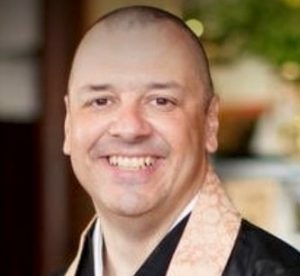
By Rev. Mauricio Ghigonetto
I hear the following questions about Buddhism: “Is there reincarnation?” “What is rebirth?” “Who or what is reborn?” Let me explain according to my understanding in hopes of providing an answer.
Imagine a plot of land. A fence surrounds the plot. The land has fertile soil with various plants growing. There are no buildings. Say you want to plant a tree and some flowers. You choose the best spot where to plant them so they look pleasing to the eye.
Imagine you inherited this property from a relative. The land stands just as it was before, with whatever was growing on it and with whatever debt and property disputes still attached.
Imagine you’re leaning against the fence, looking at the land, thinking what to do. Like anything in life, you may choose to do nothing. If nothing is done, as time passes, bushes will grow, trees may bear fruit, and plants will blossom. The land has a natural cycle that flows with or without your interference.
Let’s say you work the land. On one side you plant a small cornfield. On the other side, you plant a dozen fruit trees. In the middle, you build a small house.
After a while, a few bean plants sprout in the cornfield. You think: “How strange! I only planted corn. How can these plants be growing here?” With a little work, you remove the sprouts you felt were invading your land. But where the bean plants grew, corn never sprouted.
On the other side of the orchard, somehow not all fruit trees germinated. The trees that grew yielded fruit that you harvest. Your neighbors use spoiled and dropped fruit and corn to fertilizer their own crops, thus creating an unplanned but beneficial relationship.
In order to grow your plants, you need water from your neighbor’s natural spring. Thus another symbiotic and interdependent relationship is formed.
On a beautiful sunny day, your tractor turns over a mound of earth, creating a ditch from which an army of caterpillars emerge that eventually attack your cornfield and orchard. You wonder: “Where did those caterpillars come from? How long have they been there? Why did they show up just now?”
There’s not much you can do. The caterpillars were there already. You think it’s bad timing but no great tragedy.
After a few decades, you resolve to leave. You look for another plot of land. You leave the land you spent years working. There’s the cornfield, the fruit tree orchard and the little house. You give the land to a friend. When you leave, she becomes the new owner.
She looks at the land and wonders what to do. She thinks, “Should I continue to grow corn? What about the orchard? I’ll plant more trees. What about water? I’ll dig my own well. Still, I must be friendly with my neighbors. What about the house? I will leave it the same.” Thus, the cycle begins anew.
The way I see it, our life is the earth, the farmer is our mind, and the decision to do something or not is our thinking. The cornfield, orchard and house are the result of our actions. Our neighbors represent “interdependence” with all beings. The flowers, corn, and fruit are the result of various causes of conditions, which we may call “karma.” The caterpillars and beans are the result of karma from the past.
What is rebirth? To me, the earth and our lives are constantly being reborn. They are affected by our actions, and by our non-actions. Our actions and judgments, non-action and non-judgments are just a part of the innumerable causes, conditions, effects and the web of interdependence that create our world, our selves and our Life.
Rev. Ghigonetto is a minister in Sao Paulo, Brazil.

